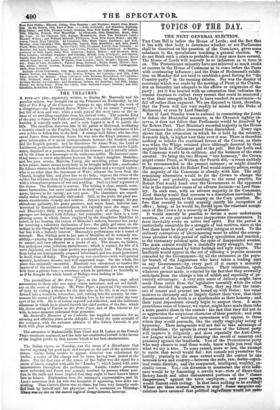THE THEATRES.
A FIVE-ACT play, apparently 'written to display Mr. Macready and his peculiar talents, was brought out at the Princess's on Wednesday, by the A FIVE-ACT play, apparently 'written to display Mr. Macready and his peculiar talents, was brought out at the Princess's on Wednesday, by the title of The King of the Commons. Strange to say, although the work of a clergyman—the Reverend James White—it is by no means "preachy," but full of love and war; while a main part of the story turns on the re- lease of an unwilling candidate from his clerical vows. The popular King of the play is James the Fifth of Scotland, the poet-soldier. His popularity- hunting is scarcely made out, and is only lugged in as if to justify the title. The exordium discovers him in his palace at Holyrood, meditating a frontier attack on the English, but chafed to rage by the reluctance of his own nobles to follow him to the field. A strange bold fellow, who has once saved James from drowning, forces his way into the King's presence, and gives information of a secret correspondence between the Scottish nobles and the English general; and he denounces Sir Adam Weir, the Laird of laichmont, as the medium of that correspondence. James sets out for Laich- mont, disguised as a yeoman, to discover the treason; and is actually select- ed by Sir Adam as a messenger to the traitorous nobles. He discovers some- thing more—a secret attachment between Sir Adam's daughter, Madeline, and her poor cousin, Malcolm Young, the unwilling priest. Returning to his palace, James causes everybody to be brought before him; confiscates Sir Adam's estates to be divided between the daughter and a wronged nephew, who is no other than the denouncer of Weir; releases the lover from the Church, knights him, and gives him to the lady; exposes the crime of the nobles, but subdues them by his generous forgiveness; and the curtain closes with a triumphant promise of war and wedding. Such is a brief argument of the drama. The treatment is uneven. The writing is clear, smooth, some- times harmonious, but never exalted or in itself very striking. Some comic parts, thrown in for variety, are very poor. The characters are superfi- cially rather than profoundly elaborated. Still, in the main, the piece pos- sesses considerable vivacity and interest. James's manly courage, his gay chivalrous gallantry, his gusty passions, and warm heart, however con- troverted by historical commentators, tell capitally upon the stage; and suit Macready's fitild, wayward sentimental style of acting. The love passages are designed with delicacy, but animation; and there is a very pleasing scene, in which James, employed by the thoughtless Madeline to extort, in her hearing, the reason of Malcolm's sadness, becomes her proxy for receiving a vehement declaration of love: the giddy girl turns on the instant to the thoughtful and impassioned woman; and James watches over her fate with a fatherly interest. Macready's performance was a round of triumph. Mrs. Stirling gave to her part of Madeline all its womanly sen- sibility,—playing the latter portion in a subdued style that was very true to nature, and very effective as a stroke of art. The drama, we believe, has undergone some judicious curtailments; which it wanted, for bits of it were ditointed, and the comic portion was positively bad. The close, too, from being too transparently prepared beforehand, and too much protracted in itself, went off flatly. The getting-up was excellent—with well-painted scenery, handsome dresses, and well-appointed stage. On the whole, the piece was eminently successful. Macready was summoned to receive the approval of the audience; and the reverend dramatist also was made to bow from a private box,—a ceremony which he performed as hurriedly as as if he thought the whole bench of Bishops were looking at him.


























 Previous page
Previous page